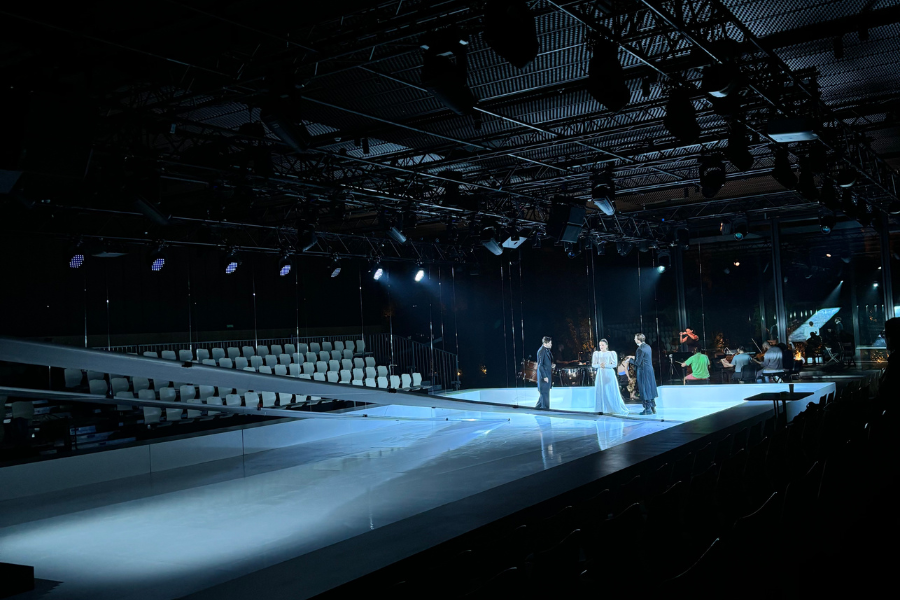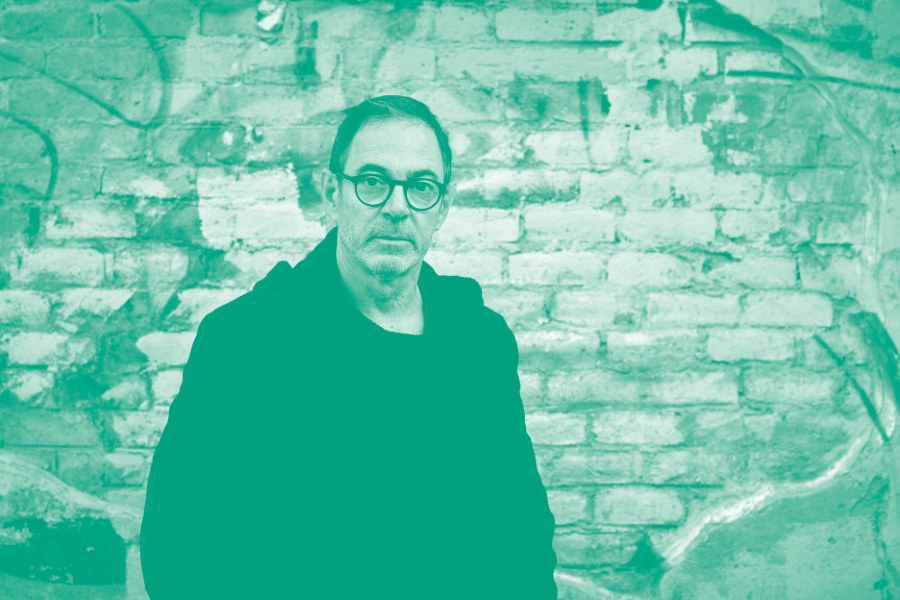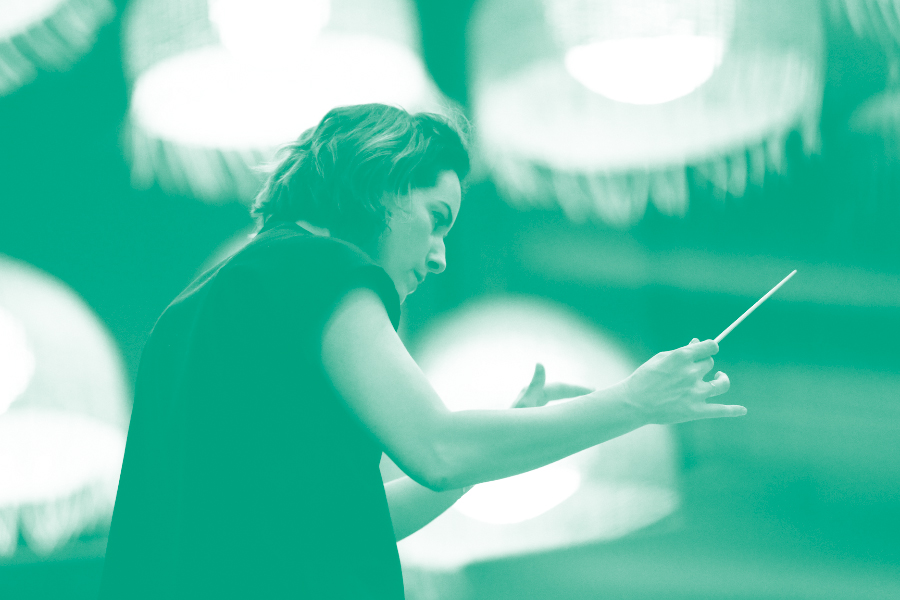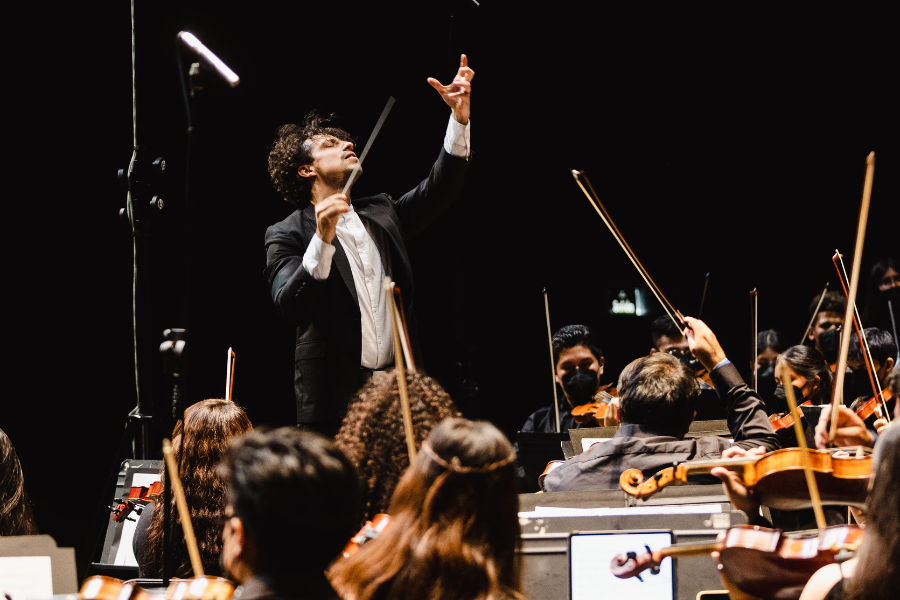Lucio Bruno-Videla: “It is time for Latin America to export its own creative production”

Interview with the composer, director and researcher Lucio Bruno-Videla
Lucio Bruno-Videla, outstanding violinist and conductor; He has worked in the dissemination of Argentine academic music since 1989. As founder and curator of the Drangosch Group (National University Institute of Art) he has been dedicated to the dissemination of the academic music of his country, becoming the first, in Argentina, to edit Scores from the original manuscripts, through the use of specialized software.
What is your vision of the current situation of opera in Latin America?
We know that Latin America has a taste for opera and related genres of Very long data. From Mexico to Argentina, the historical theaters that are still standing and the most modern ones, constitute by themselves a world-class architectural and cultural heritage, and as such, there should be a Latin American catalog of theaters that allow them to be known and (re ) value them. However, a theater without work that is represented, has no reason to be. The great Argentine composer Juan Francisco Giacobbe (1907-1990), author of more than 20 scenic works, spoke of the local problem referring to the “continent without content”. That is, in Europe the theaters were built as a need to house the work created by the same society, in Latin America the theaters are built to house … the work of others. Actually, content is what gives meaning to a theater. The “what?”, The “why?” Are the first two questions that I should – in my opinion – make an artistic management of a theater. Then the question “how?” Will come. The latter is very important. Although it seems that the most difficult to obtain is financing, the most important thing is always to know why such content is chosen (operatic title), and what objectives and benefits are expected in the future of that election.
I therefore believe that the current situation of the many and very important Theaters throughout Latin America, it is the perfect one to work together to put together a repertoire of your own, starting to ask us these questions: do you choose to invest millions of dollars in setting up a European contemporary opera still unknown in Latin America for three or four functions, or a production is filmed of a local opera and is marketed worldwide promoting it as heritage and representation of the country?
What are the Latin works that have drawn your attention throughout your 30 years of experience and why?
Restricting the lyric genre, I must say that the knowledge of Latin American operas even for those of us interested in the subject is practically nil. I have in my library the Dictionary of the Mexican opera by Octavio Sosa. Hundreds of operas mentioned. How many of them are in commercial record catalogs? How many scores of them can be purchased commercially?
In this sense, I can only speak with knowledge and ownership of the Argentine operas, which with great effort of many years I could track, study and know, with the exception that an opera can only be appreciated in its true value after attending its Scenic representation, and this, only if it had been represented with quality in all its aspects (vocal, instrumental, scenographic, interpretive, etc.).
I started to get interested and spread the Argentine academic music 30 years ago but my knowledge of Argentine opera is somewhat more recent, due to the great difficulty in accessing the manuscripts (the commercial publication of them has been in practice a utopia in Argentina). One of the characteristics that most attracts attention in this corpusis its rich diversity and variety, both stylistically and in the topics addressed. In this area we have foundational myths, exoticism, psychological costumbrismo, Greco-Roman myths, experimental futurism, historical themes, magical realism, surrealism, fantasies, allegories, idylls, epics, social denunciation, etc.
Something to consider is also the conceptual origin of the libretto, something in general not taken into account. We tend to generalize the word “opera” as a kind of drama put into music, of which our models are Verdi, Wagner, Puccini, Strauss…. However, the ideas of the authors may have subtle variables that at the time of elaboration of the stage direction and musical interpretation, can change the entire conception of the work. Ais not the same gaucho romance as a lyrical episode, a dramatic poem that a joke. If we were to stage a lyrical fantasy like The Dream of Alma de López Buchardo, we must understand that the knot of the plot will not be what corresponds to highlight the work from the stage and the musical, but to capture the viewer and lead it to that world of magic and idyll where time goes by very differently from that of a drama. It is therefore necessaryaddress scenery, stage direction, lighting, rendering, voices and even a special orchestral sonority, because if not, the work does not meet its goal ofconsistency. The public does not perceive why the work wrongly addressed does not work, but does perceive that it does not understand, in short, the work fails. And of course the public and critics believe that all responsibility lies with the authors.
As for the Argentine operas, in order to have an opinion, I think it is necessary to see them well represented and interpreted. You could start with a serious and exhaustive study of the composers who most insisted on the genre in Argentina, and that we could consider foundational: Arturo Berutti (1858-1938), Constantino Gaito (1878-1945), Felipe Boero (1884-1958 ), Alfredo Schiuma (1885-1963) and Enrique Mario Casella (1891-1948). In them is almost all the germ of what would come next: from traditionalconceptions Italian-French, to Wagnerian, from dramas to comedy, from exotic, historical and European themes, to nationalism and Americanism, from inclusion from winks to tango and jazz, to surrealism and the experimental multimedia modernist style that is clearly reflected in Casella’s latest operas. You could almost say that everything that came later was somehow based on these five composers.
A selection of Argentine operas to form a repertoire canon would be a relatively extensive list, since the diversity exposed supports the idea of Latin American social and psychological complexity, and we must understand that the multiple aesthetics to which the composers have resorted prevent us from comparing a work of 1910 as another of 1990. Therefore, it would be necessary to establish categories for each style, and then suggest in them the works that could be the most representative or effective. In addition to the very varied operas of the five previously named composers, we could not do without some titles by Miguel Rojas (1845-1904), Hermann Bemberg (1859-1931), Antonio Restano (1860-1928), Justino Clérice (1863-1908 ), Eduardo García Mansilla (1871-1930), Héctor Panizza (1875-1967), Pascual De Rogatis (1880-1980), César Stiattesi (1881-1934), Carlos López Buchardo (1881-1948), Floro Ugarte (1884- 1975), Juan Bautista Massa (1885-1938), Raúl Espoile (1888-1958), Gilardo Gilardi (1889-1963), Athos Palma (1891-1951), Juan José Castro (1895-1968), María Isabel Curubeto Godoy ( 1896-1959), Jacobo Ficher (1896-1978), Honorio Siccardi (1897-1963), Juan Francisco Giacobbe (1907-1990), Domingo Calabró (1910-1979), Roberto García Morillo (1911-2003), Héctor Iglesias Villoud (1913-1988), Alberto Ginastera (1916-1983), Pompeyo Camps (1924-1997), Juan Carlos Zorzi (1935-1999) and Gerardo Gandini (1936-2013).
In what position do you consider the opera developed in Latin America versus European or North American?
It does not seem fair to compare budgetary situations between the United States, Europe and Latin America, but it seems to me that Latin America should give more space to its creators, always in a justified, orderly manner and with clear objectives and actions. It is not a matter of more or less patriotic improvisations. We have had enough of that. So far there have been neither contests nor commissions. It is necessary to optimize efforts and investments in results that stabilize over time in international circuits. That is, if a theater programs a local opera, and that huge effort ends in four functions in the middle of the room and a lousy audiovisual record, the only thing that encourages is a deficit. Among the Argentine repertoire, I know more than a dozen operas that, if they can register with audio-visual optimum quality and establish a marketing plan for the registration of the complete product as a “cultural and quality brand” of the country, sure that over the long term term investment will give profits, and I do not mean only monetary gains, but in many other fields, such as the image-country at international level and the technical and artistic capacity for realization. It is time for Latin America to export its own creative production and change its position in this regard, for its own benefit. Today, Latin America seems more interested in subsidizing the musical education of lyrical singers and then expelling them or losing them, and they join the artistic bodies of European theaters. That is, Latin America invests the effort, Europe usufructua.
What do you think is the Latin contribution to gender?
You could speak at many levels, from the talent of technicians, stage directors, opera directors, singers, etc. even what I think is the most substantial: creative activity. In the case of Argentina, we have great international performers who soon arrived at the temples of European lyric in times where it was much more difficult than today. Singers like Hina Spani, prove it, to name a single case. Héctor Panizza, Ferruccio Calusio, Francisco Paolantonio and Carlos Cillario were four Argentine orchestra conductors who managed to quickly position themselves in the most enriched circuits of the lyric in the 20th century.
But it is in musical creation that I would like to stop. The Argentine opera – and I suppose that I will not be mistaken if I extend the idea to Latin American opera – contributed much new to the genre, and this contribution has not yet been recognized simply by pure ignorance, ignorance, misunderstanding, arrogance or colonial pruritus. If we leave aside the very large number of arguments on local themes (literary contribution) and related music, at a more subtle level we can talk about a multiplicity and juxtaposition of stylistic musical elements (sonorities, techniques, concepts, etc.) that present many Latin American works in combinations rarely found in European music, or that do not conform to the idiosyncrasy of the central culture, and therefore give away our identity. Sometimes we also find a mixture of genres. In other cases, the syntactic discourse of music is rooted in extra-European conceptual elements. Sometimes there is amalgam, the more, syncretism.
How do you visualize that Latin theaters are related in that aspect and how have they reinvented themselves to take charge of the new challenges of the genre?
From Buenos Aires, I think we need more interaction with opera houses in Latin America. Chile and Uruguay are nearby places, which are kept in mind, but beyond Brazil everything is unfortunately more diffuse and the news from Europe and the United States is too strong and traditional pressure. Therefore, I believe that the road to travel is hard and long, but it must necessarily be based on own content, that is, operas by Latin American authors. Go back to what Giacobbe said and that I commented above. I think it is the most coherent, most original and valid contribution we can offer to the history and the international opera movement. Of course, this does not mean closing in a cheap chauvinism – which has caused so much harm in our lands – but on the contrary, it is about looking for a cause, a proper objective for which to fight, work and make ourselves known and that Transform into benefits of magnitude, in the medium and long term.
In the 21st century, we cannot continue to believe in the “universal” values of European musical art and continue thinking that “that is enough”. There is no culture that can be developed, they are only external values. In reality, on the contrary, no matter how good they are, the problem is that their light dazzles us and finally we stop producing, knowing and sharing our values. And then, paraphrasing my teacher Juan Carlos Zorzi, we will be doomed to failure, spiritual misery … and material. It is my wish that Opera Latin America can help and collaborate so that the operatic contents of our beloved countries are known, first, by Latin Americans, and then, by the world. Only from there we can objectively weigh their values. For the works that I already know, I have no doubt that the long-term result would bring benefits not even imagined today. For my part, all the work of Opera Latin Americadirected towards these ends will have my support and contribution.
Lucio Bruno-Videla
Buenos Aires, October 23, 2019.





